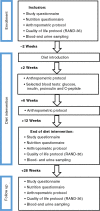An Okinawan-based Nordic diet improves anthropometry, metabolic control, and health-related quality of life in Scandinavian patients with type 2 diabetes: a pilot trial
- PMID: 27664051
- PMCID: PMC5035506
- DOI: 10.3402/fnr.v60.32594
An Okinawan-based Nordic diet improves anthropometry, metabolic control, and health-related quality of life in Scandinavian patients with type 2 diabetes: a pilot trial
Abstract
Background: Our hypothesis was that a modified diet would improve blood glucose control with beneficial impact on weight management and overall health in established diabetes.
Objective: This prospective interventional study investigated the clinical effect of an Okinawan-based Nordic diet on anthropometry, metabolic control, and health-related quality of life (HRQoL) in Scandinavian type 2 diabetes patients.
Design: Food was prepared and delivered to 30 type 2 diabetes patients. Clinical information along with data on HRQoL, blood samples, and urine samples were collected during 12 weeks of diet interventions, with follow-up 16 weeks after diet completion.
Results: After 12 weeks of dietary intervention, a reduction in body weight (7%) (p<0.001), body mass index (p<0.001), and waist circumference (7.0 cm) (p<0.001) was seen. Improved levels of proinsulin (p=0.005), insulin (p=0.011), and fasting plasma glucose (p<0.001) were found already after 2 weeks; these improved levels remained after 12 weeks when lowered levels of C-peptide (p=0.015), triglycerides (p=0.009), total cholesterol (p=0.001), and low-density lipoprotein-cholesterol (p=0.041) were also observed. Insulin resistance homeostasis model assessment for insulin resistance was lowered throughout the study, with a 20% reduction in hemoglobin A1c levels (p<0.001) at week 12, despite reduced anti-diabetes treatment. Lowered systolic blood pressure (9.6 mmHg) (p<0.001), diastolic blood pressure (2.7 mmHg) (p<0.001), and heart and respiratory rates (p<0.001) were accompanied by decreased cortisol levels (p=0.015) and improvement in HRQoL. At follow-up, increased levels of high-density lipoprotein-cholesterol were found (p=0.003).
Conclusion: This interventional study demonstrates a considerable improvement of anthropometric and metabolic parameters and HRQoL in Scandinavian type 2 diabetes patients when introducing a modified Okinawan-based Nordic diet, independently of exercise or other interventions. Through these dietary changes, anti-diabetes treatment could be decreased or cancelled.
Keywords: Nordic diet; Okinawan diet; anthropometry; interventional study; metabolic control; quality of life; type 2 diabetes.
Conflict of interest statement
Conflict of interest and fundingSS is the founder of Igelösa Life Science AB. The other authors have no conflicts of interest.
Figures
Similar articles
-
Dietary intervention with an Okinawan-based Nordic diet in type 2 diabetes renders decreased interleukin-18 concentrations and increased neurofilament light concentrations in plasma.Nutr Res. 2018 Dec;60:13-25. doi: 10.1016/j.nutres.2018.08.002. Epub 2018 Aug 19. Nutr Res. 2018. PMID: 30527256 Clinical Trial.
-
An Okinawan-based Nordic diet improves glucose and lipid metabolism in health and type 2 diabetes, in alignment with changes in the endocrine profile, whereas zonulin levels are elevated.Exp Ther Med. 2019 Apr;17(4):2883-2893. doi: 10.3892/etm.2019.7303. Epub 2019 Feb 22. Exp Ther Med. 2019. PMID: 30936958 Free PMC article. Review.
-
An Okinawan-Based Nordic Diet Leads to Profound Effects on Gut Microbiota and Plasma Metabolites Linked to Glucose and Lipid Metabolism.Nutrients. 2023 Jul 24;15(14):3273. doi: 10.3390/nu15143273. Nutrients. 2023. PMID: 37513690 Free PMC article.
-
Almonds vs complex carbohydrates in a weight reduction program.Int J Obes Relat Metab Disord. 2003 Nov;27(11):1365-72. doi: 10.1038/sj.ijo.0802411. Int J Obes Relat Metab Disord. 2003. PMID: 14574348 Clinical Trial.
-
[Effects of Dietary and Physical Activity Interventions on Metabolic Syndrome: A Meta-analysis].J Korean Acad Nurs. 2015 Aug;45(4):483-94. doi: 10.4040/jkan.2015.45.4.483. J Korean Acad Nurs. 2015. PMID: 26364523 Review. Korean.
Cited by
-
A Comprehensive Review of Phytonutrients as a Dietary Therapy for Obesity.Foods. 2023 Sep 28;12(19):3610. doi: 10.3390/foods12193610. Foods. 2023. PMID: 37835263 Free PMC article. Review.
-
Improved General and Oral Health in Diabetic Patients by an Okinawan-Based Nordic Diet: A Pilot Study.Int J Mol Sci. 2018 Jul 3;19(7):1949. doi: 10.3390/ijms19071949. Int J Mol Sci. 2018. PMID: 29970834 Free PMC article.
-
Calprotectin in serum and zonulin in serum and feces are elevated after introduction of a diet with lower carbohydrate content and higher fiber, fat and protein contents.Biomed Rep. 2017 Apr;6(4):411-422. doi: 10.3892/br.2017.865. Epub 2017 Feb 22. Biomed Rep. 2017. PMID: 28413639 Free PMC article.
-
Intrinsic and environmental basis of aging: A narrative review.Heliyon. 2023 Jul 18;9(8):e18239. doi: 10.1016/j.heliyon.2023.e18239. eCollection 2023 Aug. Heliyon. 2023. PMID: 37576279 Free PMC article.
-
Digesting the Impact of Diet on Irritable Bowel Syndrome (IBS): Exploring Solutions for Controlling IBS.Cureus. 2023 Sep 15;15(9):e45279. doi: 10.7759/cureus.45279. eCollection 2023 Sep. Cureus. 2023. PMID: 37846263 Free PMC article. Review.
References
-
- International Diabetes Federation. IDF diabetes Atlas. 7 ed. Brussels, Belgium: International Diabetes Federation; 2015. - PubMed
-
- Rexrode KM, Manson JE, Hennekens CH. Obesity and cardiovascular disease. Curr Opin Cardiol. 1996;11:490–5. - PubMed
-
- Heller RF. Hyperinsulinemic obesity and carbohydrate addiction: the missing link is the carbohydrate frequency factor. Med Hypotheses. 1994;42:307–12. - PubMed
-
- Ramachandran A, Snehalatha C, Mary S, Mukesh B, Bhaskar AD, Vijay V. Indian Diabetes Prevention Programme (IDPP). The Indian diabetes prevention programme shows that lifestyle modification and metformin prevent type 2 diabetes in Asian Indian subjects with impaired glucose tolerance (IDPP-1) Diabetologia. 2006;49:289–97. - PubMed
LinkOut - more resources
Full Text Sources
Other Literature Sources


